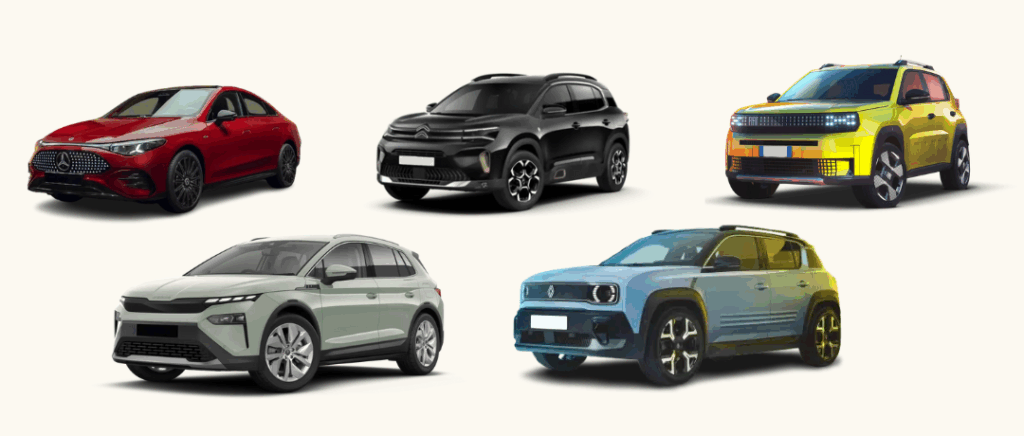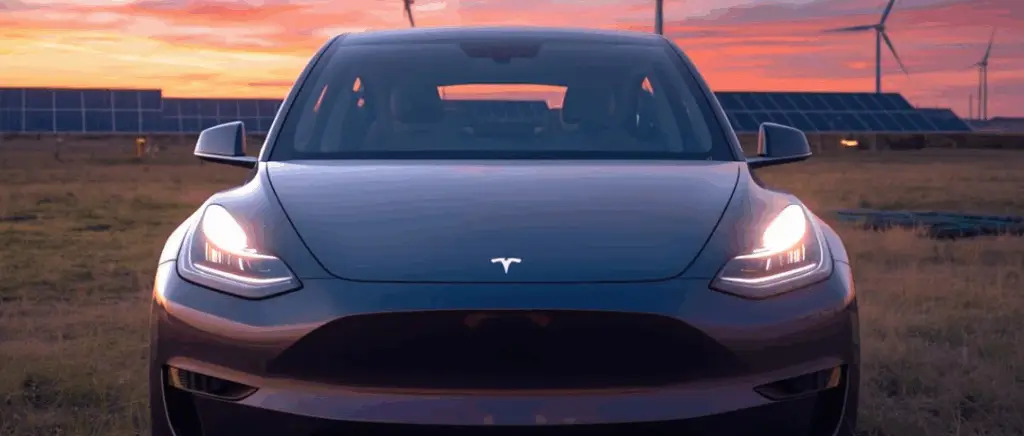Monday to Friday 9am - 12.30pm - 2pm - 7pm
1. Electric cars don't have enough power.autonomy
In 2019, the average number of kilometres travelled per French person was 12,223 kilometres. This corresponds to around 35 km per day per French person. The figures for 2020 are not relevant, because of traffic regulations. Even the electric car with the smallest range (the Citroën AMI has a range of 70 km) is capable of covering this distance without the risk of breaking down en route.
Even in the 90s, electric vehicles had sufficient range to make these daily journeys. Citroën's famous J5 van came out in an electric version in 1989, and had a range of 70 km too!
Whether it's a city car, like the BMW i3or an SUV, like the Kia Niro EVWith a range of between 350 km and 450 km, there's plenty of scope for a great ride! We've also thought of the adventurers who want even more freedom, who can opt for the Tesla with its long range of 610 km (WLTP) for the Tesla Model S491 km for the Tesla Model 3 and 505 km for the Tesla Model Y... So you can visit the birthplace of wine and take advantage of the charging stations offered by the city of Bordeaux!
2. Electric cars are expensive
An electric car costs an average of €30,000. However, for high-performance models like the Dacia SpringYou can own an electric car, with a range of 230 km, for less than €20,000!
You can also benefit from these vehicles through leasing offers. Depending on your needs, you can take out a LMD, LLD or even LOA.
You should also bear in mind that recharging costs around 2 €/ 100 km This compares with an average of €8.4/100 km for a petrol car.
And the savings don't stop there! With the ecological transition at the heart of the current debate, the government and local authorities have introduced subsidies to help reduce the real cost of your electric car. So you can benefit from :
- from the conversion premium,
- from environmental bonus (can be combined with the conversion allowance),
- regional aid...
Note also Emmanuel Macron's plan to be able to an electric car for €100/month.
Beev helps you to funding of your projectSo don't hesitate to contact us, we're here to help!
3. Electric cars are not so environmentally friendly
First and foremost, we need to be careful about confusing direct emissions with total emissions. In fact, in most cases, the data on electric cars These figures include emissions produced downstream and during use, whereas for internal combustion vehicles, direct emissions (tailpipe) are more often taken into account. Comparing these figures, which are not based on the same elements, suggests that electric vehicles are not so clean.
As a result, when we take into account emissions from extraction, transport, use and recycling, on average.., electric cars emit 100 g of CO2/kmThis is half the figure for internal combustion vehicles, which emit between 200 and 250g of CO2/km! What's more, between 2016 and 2030, l'carbon footprint of electric vehicles could rise from 25% to 20%. Bearing in mind that the sale of petrol and diesel vehicles in France will be banned by 2035This gives our electric cars a great deal to look forward to!
4. Electric cars are slow
A prejudice that could offend our famous American manufacturer Tesla, which is offering us a Tesla Model S reaching 100 km/h in 3.2 seconds! And our electric city cars have nothing to envy when it comes to these performances. Peugeot e-208 which accelerates to 100 km/h in 8.1 seconds.
What's more, these vehicles have a special feature that enables them to perform so well: the absence of a clutch. In fact, without this pedal that allows you to change gear, you gain in fluidity and avoid possible jerks between gear changes. As a result, you enjoy a more pleasant drive and pick up more quickly, making you more competitive.
Don't hesitate to consult our article with the electric car tests !
5. Batteries do not last long and are not recycled
Contrary to popular belief, the battery a electric car has a lifespan of between 10 and 20 years, which is reassuring news! While you're waiting for these decades to pass, a few simple things you can do on a daily basis (adopting eco-driving techniques, using regenerative braking, etc.) can help you to keep your car in good working order.save your vehicle's battery.
As far as recycling is concerned, the progress that has been made means that, on average, between 95 and 98% of the materials making up the battery can be extracted and recycled. The materials recovered are sorted and recycled as much as possible to improve our environmental impact. In addition, European regulations require that a minimum of 50% of the materials contained in a battery be recycled, with certain rare metals such as lithium, lead and zinc being recycled. cobaltthe nickel or copper are recoverable at 90%. Recycling electric car batteries is true!
Discover several models of electric vehicles that can be delivered quickly!
6. Batteries take too long to charge
It all depends on where you charge your car and at which chargepoint... What's more, if you compare the time it takes to charge your car at home with a charge made using Terra 360 terminalwhich allows all vehicles to be recharged in 15 minutes, yes the charging time will seem long.
As an indication, for a home recharge, with a reinforced socket or thanks to a WallboxThe charge time is between 3 and 15 hours, giving you a restful night's sleep while you wait for your vehicle to recover its energy.
In terms of charging stations their recharging capacity is equivalent to that of public WallboxThat's two to three times faster than with your reinforced plug!
Finally, you can recharge your vehicle on the motorways, which are equipped with fast charging stationsso you can continue your journey with peace of mind. Thanks to these charging points, you can recharge 80% of the battery in 20 minutes! Tesla has also set up superchargers for all Tesla drivers, so you can recharge your vehicle quickly (< 30 minutes) and get a free charge at the same time!
Read also: The 10 best charging points on the market.
7. Electric cars are expensive to maintain and repair
This myth about the price of electric car repairs/maintenance also stems from a common misconception. It's true that in the first year of owning your electric vehicle, possible repair or maintenance costs tend to be higher. However, because of their performance, electric cars are less likely to break down or require as much sustained maintenance as a conventional car. thermal vehicle.
The composition of electric cars, with fewer parts inside the vehicle, means that maintenance procedures are lighter. Fewer parts are in motion, which considerably reduces the risk of wear and tear leading to repairs.
What's more, maintenance costs for an electric vehicle are estimated at €800/year, compared with €1,000/year for a combustion vehicle.
Read also: The profitability of an electric car.
8. Without an established recharging infrastructure network, electric cars will not be practical
According to the national barometer of charging infrastructures open to the publicAccording to a joint report by Avere France and the French Ministry of Ecological Transition, there were 57,732 charging points open to the public in France on 31 March 2022. It's worth noting that most (55%) of these charging points have an output of 22 kW, the power of a Wallbox. We therefore remember the speed of these charging stations !
What's more, it's important to point out that most recharging is done at home, and to come back to the first point, your charged electric car in the morning will allow you to get to work without a break.
Beev offers you its charging pointwith 22 kW three-phase power, so you can enjoy a car that's ready to take on the day.
Not to mention the fact that more and more companies are providing charging points for their employees and sometimes their customers.
For companies interested in installing charging points, don't forget that Beev is there to help you with your project.
In one of our articles, we brought together for you 5 reasons to install charging points on your premises !
9. The electricity grid could not cope with the demand for recharging
By 2035, when petrol and diesel vehicles will cease to be sold, there will be around 15.6 million electric vehicles. This would be equivalent to 34 TWh, representing 7% of final electricity consumption, which raises questions about the capacity of our network to support this increase.
Thanks to the progress already made, and still to come, in the energy transition, France will be able to meet this additional demand. Indeed, the insulation of homes, through a flexibility of the electricity systemThis, combined with the fact that we have been able to use the latest generation of electric vehicles, means that we can be reassured about the fuel consumption of electric vehicles, which is reasonable in absolute terms.
That's enough to convince us, bearing in mind that the additional demand for millions of vehicles will not be met overnight, which gives our network the opportunity to adapt as best it can without citizens paying a high price.
More and more companies and individuals are deciding toinstall photovoltaic panels to take advantage of the sun's energy. So not only are you saving money with this investment, but you're also doing something for the planet by receiving financial assistance!
10. Electric cars catch fire a lot
Last but not least, electric cars are more likely to catch fire than internal combustion vehicles. Whether it's a combustion or electric vehicle, engines don't like fire, but there are particular concerns about batteries. It's true that lithium batteries burn for a long time and need to be managed to prevent fire from spreading, but there's good news!
According to a study by the American insurance company autoinsuranceEZOn average, 25 electric vehicles catch fire for every 100,000 sold, compared with 3,474 combustion vehicles for every 100,000 sold. Yes, the current car fleet is largely made up of combustion vehicles, but once the proportionality is taken into account, the risk of electric cars catching fire is 60 times lower than that of combustion vehicles.
In conclusion, in this article we have debunked 'just' 10 myths, but you can find others that have developed around electric cars. So it's worth taking the experts' advice on this one!
What do you think of this news? We'd love to hear what you think!
































